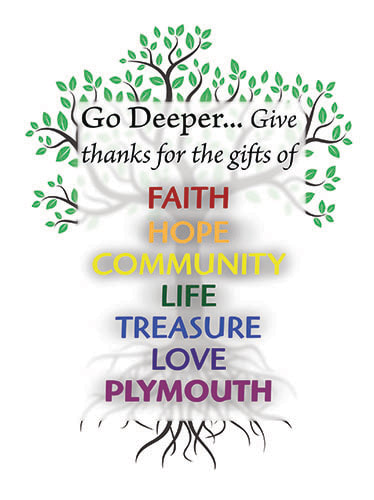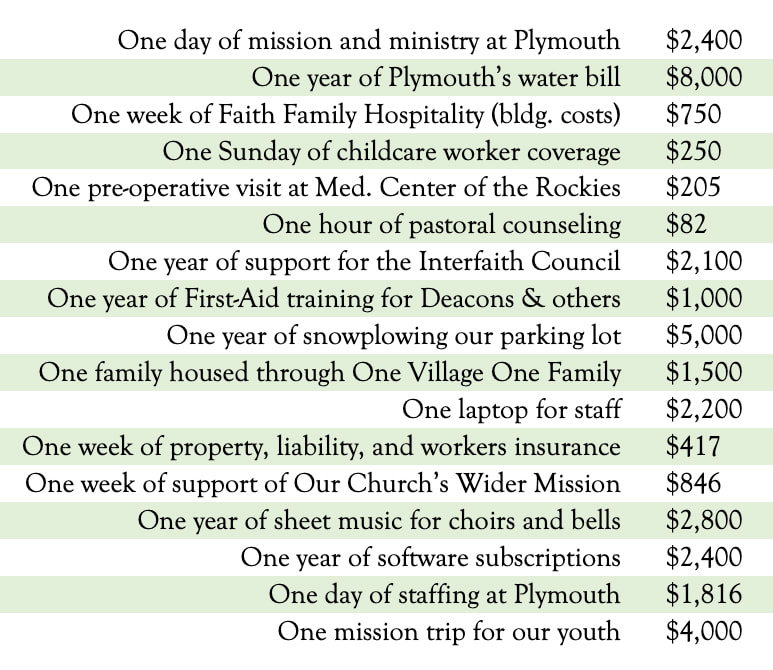 Image: Pixabay Image: Pixabay As I was walking back to my office on Sunday after the (indoor) potluck luncheon following the (indoor) service, I felt the warm glow of love for our congregation. The potluck was phenomenal, and the “loaves and fishes effect” was in full swing with food in abundance! Somehow, all the logistical shifts we made due to the torrential rain seemed to fall into place: dedicated A/V volunteers, fabulous music, inspiring lay preachers and liturgist, our phenomenal Deacons, our revitalized Congregational Life board, and our amazing staff all worked together to make an enlivening (indoor) service and potluck lunch come off without a hitch! It all looked seamless and easy…but a large contingent of Plymouth folks was hard at work making everything happen. I was worried that the heavy rains would dampen our attendance and that we’d have a half-empty sanctuary, but it was quite full! YAY, Plymouth! When I came home, the first thing I told Jane Anne was, “I love our church.” Paul opens his first letter to the church in Corinth by saying, “I thank my God always for you, because of God’s grace that was given to you in Christ Jesus. That is, you were made rich through him in everything.” That is what I felt on Sunday. Our congregation has been enriched and enlivened by the Spirit and the wisdom of Jesus. You can feel new energy and new vitality happening in all corners of our congregation. Maybe you came away on Sunday with a similar experience of loving God and loving the people she has called together to form Plymouth. We are not perfect, “not a congregation of the sinless,” as our membership covenant replies. And yet…there is so much goodness, so much energy, so many things percolating that I cannot help but be grateful for the abundance of wonderful folks who comprise Plymouth. Paul speaks of the abundance of God’s grace given to us through Jesus Christ, and I see that in the incredibly giftedness of our congregation. I’m reading a good, challenging book by Yale theologian Miroslav Volf right now called, Free of Charge: Giving and Forgiving in a Culture Stripped of Grace. Volf speaks about God as the ultimate giver and says that we cannot return a gift to God, who has everything and needs nothing. But he does see us as a conduit for the action of God in the world. “Faith is an expression of the fact that we exist so that the infinite God can dwell in us and work through us for the well-being of the whole of creation.” He continues, “Faith is the first part of the bridge from self-centeredness to generosity.” In our culture, we see almost everything as an economic transaction, giving this in exchange for that. God’s economy doesn’t work that way, and that “gift economy” is what I saw in action last Sunday. We worked, prayed, sang, celebrated, and ate together. Together, we recognized God as the giver. And we took some of what he had given to us and turned it not toward ourselves, but toward this vibrant community of faith. And as we were cleaning up after the potluck, we saw more abundance and faith, as volunteers from our Faith Family Hospitality Ministry Team set up cots for the families without housing who are sharing our church building this week. One of the most important parts of growing in discipleship is to be part of God’s “gift economy.” Growing in faith can help us acknowledge that everything we have and are comes from God. And then to put our faith into action as conduits of God’s grace and abundance. “The gifts flow into us, and they flow from us,” Volf writes. “We are God’s gifts to our neighbors.” May we continue to grow in faith and awareness of the gifts God entrusts to us. Shalom!  Image: Skitterphoto on Pexels Image: Skitterphoto on Pexels For the Missions Marketplace in November, Anabel (age 7) wanted to contribute. She loaded up a small purse with her money and we headed off to church. Without knowing anything about money and finances, Anabel was clear that she wanted to donate her money to help others. What she really didn’t know is that all 300 of her shiny coins were only worth about $3.00. Her contribution, although small, was significant for her. She gave that money with a cheerful heart. Money is a tricky topic. People do not like talking about money because it can be uncomfortable. As a Church, though, this is a topic that won’t be going away. Our Church is thriving right now – the pews were full on Sunday, people are excited for upcoming events, and more than anything, our community wants to help others. But excitement and the desire to serve don’t pay our bills. They don’t fix the deficit in our budget. As chair of Budget and Finance last year, it was evident that unless we want to lay off our staff, we do not have money to cut out of our budget. We can reduce a little bit here and there, but ultimately, unless people step up and contribute financially, we cannot sustain our current situation. Our finances are not getting better, and it is time for Plymouth, as a community of believers, to make some changes. Not everyone has money to give to the Church, but many people do. If you love Plymouth and you want to see Plymouth continue to be a beacon of hope in an increasingly chaotic world, now is the time. Visit plymouthucc.org/give to learn more. Heather Heather Siegel 2023 Moderator  A wonderful hymn, “God of the Sparrow, God of the Whale” (NCH 32) poses couplets of questions for us: “How does the creature say awe…praise, grace…thanks, care…life, joy…home.” Think about those pairings and how they play out in your own life: Do you respond to an awe-inspiring sunrise by praising God? Do you answer God’s grace by saying thanks? Is your response to being cared for by God to regard the sanctity of all lives? Do you respond to joy by acknowledging that you are at home with God? I wonder if a prevalent sin many of us commit is taking it all for granted…as if we deserve it and that it will always “just be there for us.” Our church home is at a crossroads, and we need your help. Because we don’t want to burn out volunteers, this year we hired a great business manager to do Plymouth’s accounting. And because technology is moving faster than any of us can imagine, we hired a great IT/Communications professional to manage our database, ensure our computers and networks are working, lay out the Placard and send you this Staff Reflection. The rub is that we, the members and friends of Plymouth, have to pay for the services of gifted staff members, and that is going to mean that all of us need to Go Deeper and ask how we can respond to God’s grace and say thanks in a tangible way: through our giving to Plymouth. Stewardship means different things to different members of Plymouth. To some, it implies giving a tithe – one-tenth of one’s income – to support the mission and ministry of the church. To others, it is one financial obligation among many others. For some of us, considering our financial pledge to Plymouth provides an opportunity to reflect on God’s abundance and grace, and as God’s creatures, we say, “Thanks!” This week you will receive in the mail a letter and brochure from our Stewardship Board with all kinds of inspiring and useful information. I invite you to read it, to look closely at the Graduated Giving chart on the back and calculate what your pledge for 2020 might be, relative to your household income. (Jane Anne and I did this, and we’re increasing our own pledge to Plymouth in 2020.) And I invite you to pray about how you, as a creature of God, will say thanks. Gratefully, P.S. At a special meeting of board chairs a few weeks ago, there was a suggestion that we emulate Heifer Project with sample giving opportunities…knowing that we aren’t actually giving a flock of geese or a water buffalo. So, I’m including some samples of what your pledge can help fund. AuthorThe Rev. Hal Chorpenning has been Plymouth's senior minister since 2002. Before that, he was associate conference minister with the Connecticut Conference of the UCC. A grant from the Lilly Endowment enabled him to study Celtic Christianity in the UK and Ireland. Prior to ordained ministry, Hal had a business in corporate communications. Read more about Hal. |
Details
|



 RSS Feed
RSS Feed